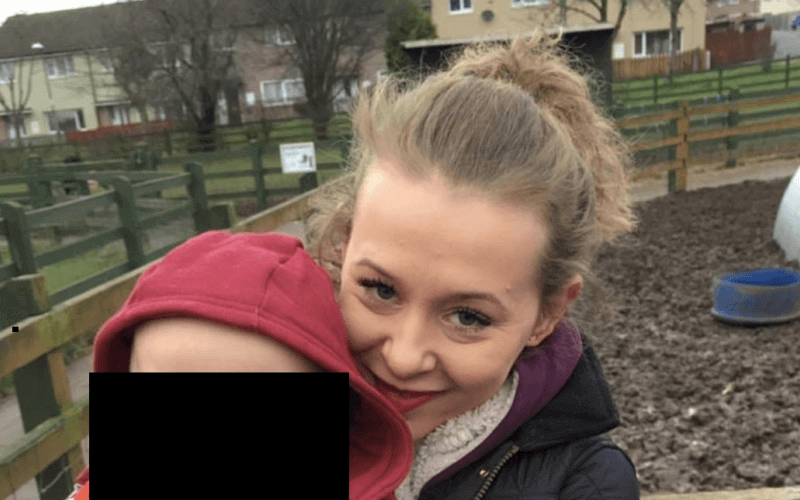A disabled woman’s sister who blames her sibling’s apparent suicide on the Department for Work and Pensions (DWP) has called for ministers and senior civil servants to be held accountable for their repeated failure to learn from similar deaths.
Philippa Day (pictured, with her son) had agoraphobia and left a note on her laptop that “directly implicated” DWP in her death because of the way it dealt with her benefit claim.
She appears to have taken her own life hours after receiving a letter refusing permission to have her face-to-face benefits assessment carried out in her own home, and telling her she would instead need to attend an assessment centre run by the private sector contractor Capita.
Her body was found the next day, 8 August 2019, by her sister and father at her home in Nottingham, with a copy of the letter lying on the pillow next to her body. She spent the next two months in a coma, and died in October 2019, aged just 27.
Her family have pointed to repeated promises by DWP to learn from the deaths of other benefit claimants linked to its failings, reported over the last six years by Disability News Service (DNS).
Philippa’s sister, Imogen, has researched some of those other deaths – including those of Faiza Ahmed, Jodey Whiting and Michael O’Sullivan – and believes they show that ministers and senior civil servants have failed in their duty to protect the lives of Philippa and other claimants.
Imogen highlights the repeated warnings made to DWP and its contractor Capita by mental health professionals – and Philippa herself – that her sister was at risk because of their actions.
Yesterday, the family of Jodey Whiting won a significant legal victory by securing permission from the solicitor general to ask the high court to order a second inquest into her death (see separate story).
Jodey’s family hope this will lead to a “full and fearless investigation into whether the DWP, and its flawed decision-making regarding Jodey’s benefits claim, caused or contributed to her death”.
As with Philippa Day, Jodey had had a request for a home assessment rejected, in her case relating to her claim for employment and support allowance.
The Independent Case Examiner concluded last year that DWP failed five times to follow its own safeguarding rules in the weeks leading up to Jodey’s suicide, 15 days after she had her out-of-work disability benefits stopped for missing a work capability assessment.
After Jodey’s death in February 2017, DWP said it was reviewing its procedures “to ensure this doesn’t happen again”.
Imogen also points to the case of Faiza Ahmed, who took her own life on 7 November 2014, several hours after telling a jobcentre work coach that she had been “busy trying to kill myself”.
The work coach failed to contact the emergency services after discussing Faiza’s written comment with a manager.
DWP ignored a coroner’s call for it to take action to prevent future deaths, following an inquest into Faiza’s suicide, and simply reminded its staff of existing guidance.
Imogen Day said: “Faiza died five years before my sister did and nothing was done, and they were very similar cases, with very similar circumstances, and no change was made that would safeguard my sister.
“It’s a systemic issue that is killing disabled, vulnerable people on a very regular basis.”
This year, DWP has also faced mounting questions over the death of Errol Graham, who starved to death after his out-of-work disability benefits were wrongly removed.
His family have won the right to have DWP’s safeguarding policies examined by the high court in January.
Asked for her message to ministers and senior civil servants responsible for these failings and those that led to her sister’s death, Imogen said: “They will be held to account for their actions.”
An inquest into Philippa’s death will be held in Nottingham next month.
Capita said it could not answer questions about Philippa Day’s death because of the ongoing inquest, but a spokesperson said: “We extend our deepest condolences to Philippa Day’s family over her tragic death.
“We are one of several parties assisting the coroner in relation to the inquest into these sad circumstances and we will continue to cooperate fully with this inquiry.”
A DWP spokesperson said: “Our condolences are with Miss Day’s family. As the inquest process is ongoing it would be inappropriate to comment at this time.”
*The following organisations are among those that could be able to offer support if you have been affected by the issues raised in this article: Samaritans, Papyrus, Mind and Rethink

 ‘Dangerous’ rollout of universal credit ‘poses threat’ to disabled claimants
‘Dangerous’ rollout of universal credit ‘poses threat’ to disabled claimants Tory MP brands plan to scrap WCA and allow work coaches to decide fitness for work ‘a crazy idea’
Tory MP brands plan to scrap WCA and allow work coaches to decide fitness for work ‘a crazy idea’ Spring tour for austerity installation on DWP deaths that was inspired by war photographers
Spring tour for austerity installation on DWP deaths that was inspired by war photographers